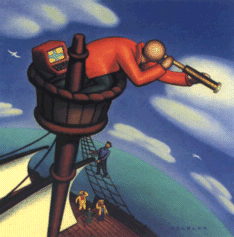Blog this, Canada: a theatrospherical State of the Union – Round 2
Guest Post by Simon Ogden of Vancouver’s The Next Stage – second in a series…
Greetings, my fellow Canadians (and theatre fans around the world), my name is Simon and I’m a blogging advocate. Which basically means I’m enamored with the potential power of internet self-publication as a business tool. I’ve been using it to much success in the past few years, and so I’m officially convinced of both its practicality and potency. Mike asked me if I would care to elaborate here (and over on my own blog), and having just publicly declared myself a blogging advocate, I had really no choice. We’re going to ping-pong a conversation about the Canadian theatrosphere spurred by Michael Rubenfeld over at Summerworks between us for a while, and see where it goes. We would be delighted if you would join the conversation, if you do your comments may be published in the hard-copy compilation in Works magazine. And we hope you do.
Preamble over, on to the business at hand…
______________________________________________________________________
CLICK HERE TO READ ROUND 1 OF THIS CONVERSATION
(it will really help to understand what follows)
thenextstage
Thanks M-Dub (if no one calls you that they should, it’s dope. S.O. just sounds like a shrug). It’s a topic that I have a peculiar amount of verve about, so this should be a good conversation. And hopefully an inspiring one.
“While the digital revolution hasn’t changed theatre much…”
Four years ago I made a prediction that the rise of the blogosphere would radically change theatre in Canada. Change it in the way practitioners thought about the way they produce work, in the way resources were shared and in the dramatic expansion of the audience base. At this point I’m prepared to say that I wasn’t altogether wrong in this prediction, but I would certainly excise the word “radically” from that sentence. The internet is proving to be a tough monster to wrangle for our particular discipline, the growth of the Canadian theatrosphere so far has proven to be relatively slow. That is, relative to tech-centric arts communities; photographers and digital artists have a surfeit of chatter to engage with on line.
It’s essential here at the outset that we define what we mean by ‘the theatrosphere’, and what exactly it means when it uses the term ‘theatre blogging’. There are a lot of active theatre blogs that aren’t really part of the theatrosphere, these are self-contained sites – usually company blogs – that post solely on their own business. These are marketing sites, and have little or no interaction with the rest of the industry online. The theatrosphere uses social media for two distinct agendas – and yes, sometimes those agendas get muddied – to market our work, and to engage in dynamic, real-time conversation with our fellows. If you’re not connecting across borders, you’re not part of the conversation. This, in a nutshell, is the great hope of the core concept of theatre blogging: to create an inter-connected, self-supported, crowd-sourcing resource hub that anyone can plug into.
To put it another way, the theatrosphere is a big ol’ cocktail party that’s always running. It’s a klatch full of a crazy array of personalities, from brash and irritating to gentle and wise. But always highly opinionated, and therein lies its true promise. I hear young theatre artists constantly complaining about how cliquey an industry independent theatre is, about how tough it is to break into ‘the scene’. What they’re talking about is information sharing; where does your audience come from, what is it about your process that works for you, how do you get to know the critics? Etc, etc. I don’t believe that we’re cliquey at all, actually, we’re an art form that does its work in little groups in little dark rooms that require a certain bond of trust to get the most from the process itself. We’re not snobby, we’re just busy. And we’d all like to meet regularly to socialize and network, but who has the time? Making the time to make connections is the next stage in the evolution of the indie theatre industry, and the internet offers the most economic solution to time-manage our networking and marketing efforts.
And yet we still lack a true National connectivity. Or even a regional one. I have amazing connections in my niche across the country (not even counting the inspiration and assistance I get from theatre bloggers in the US – which has a busier if not a more comprehensive blog community – and the rest of the world), but the actual amount of theatre practitioners walking into this cocktail party is shockingly small. Engagement is so easy to measure on the blogosphere, because the platforms themselves tell you when someone is talking to you or about you. There is still only a handful of engaged theatre bloggers across the entire country. I know of exactly zero East of the Rockies until you hit Toronto, then a couple in Ottawa and…that’s pretty much it. Where are the theatre bloggers, Canada? Edmonton? Winnipeg? What’s up?
As for the question of comics marketing themselves on social media better than theatre, well, maybe. But it’s kind of apples and oranges, stand-up comedy is YouTube friendly, it fulfils it’s core objective – to make you laugh – on the computer almost as much as it does live. But theatre’s objectives – to make you feel, connect, respond viscerally – just don’t translate that well to 2D. Televised theatre looks like crap, unless it’s shot well and then it suffers the iniquity of being mutated into a different medium. On top of that, the public at large understands stand-up, it’s something they already want, while they still mostly think of us as tight-wearing, Elizabethan-blathering bores. So we have to get mighty creative with how we sell ourselves on the web. It’s happening, there are some wonderful explorations in digital marketing going on in our corner of art, but it is truly in its infancy. To grow it’s going to need a movement. We have to find some way of selling the power of blogging to the world of theatre, to create a true National presence. To brand independent theatre as a mighty, united force to be reckoned with. And then the people will come.
MK
Simon, I certainly agree with what you say in terms of comedy being a much friendlier video medium. I haven’t figured out any way to create a video to promote a play reading festival so if someone has ideas I’d love to listen.
I know for me that I’m a lot less engaged in blogs, even my own, because of needing more time away from the computer and from Twitter. Twitter’s much less time consuming way of receiving and conveying information. I’m not sure if that says something about me or if that’s a trend in general. The more growth there is, the more overwhelmed I feel by it all.
I’m curious to see where this experiment between the two of you leads. I’m one of those lucky people who have met both of you and have a ton of respect for how the two of you manage to stay engaged in the blogosphere on top of all the other things you do.
thenextstage
Twitter’s really got you, eh? I totally get it, there’s been a real waning of the blogoshpere since twitter tipped. And that’s probably a good thing, full posts tend to be fewer and farther between, but the quality has escalated.
Another tick in the win column for twitter.
There actually were a ton of theatre co’s here that had never blogged that jumped on twitter, it’s my sincere hope that it proves a gateway to full blogging. Because I’d really love to hear about their work from the artist’s perspective.




Recent Comments